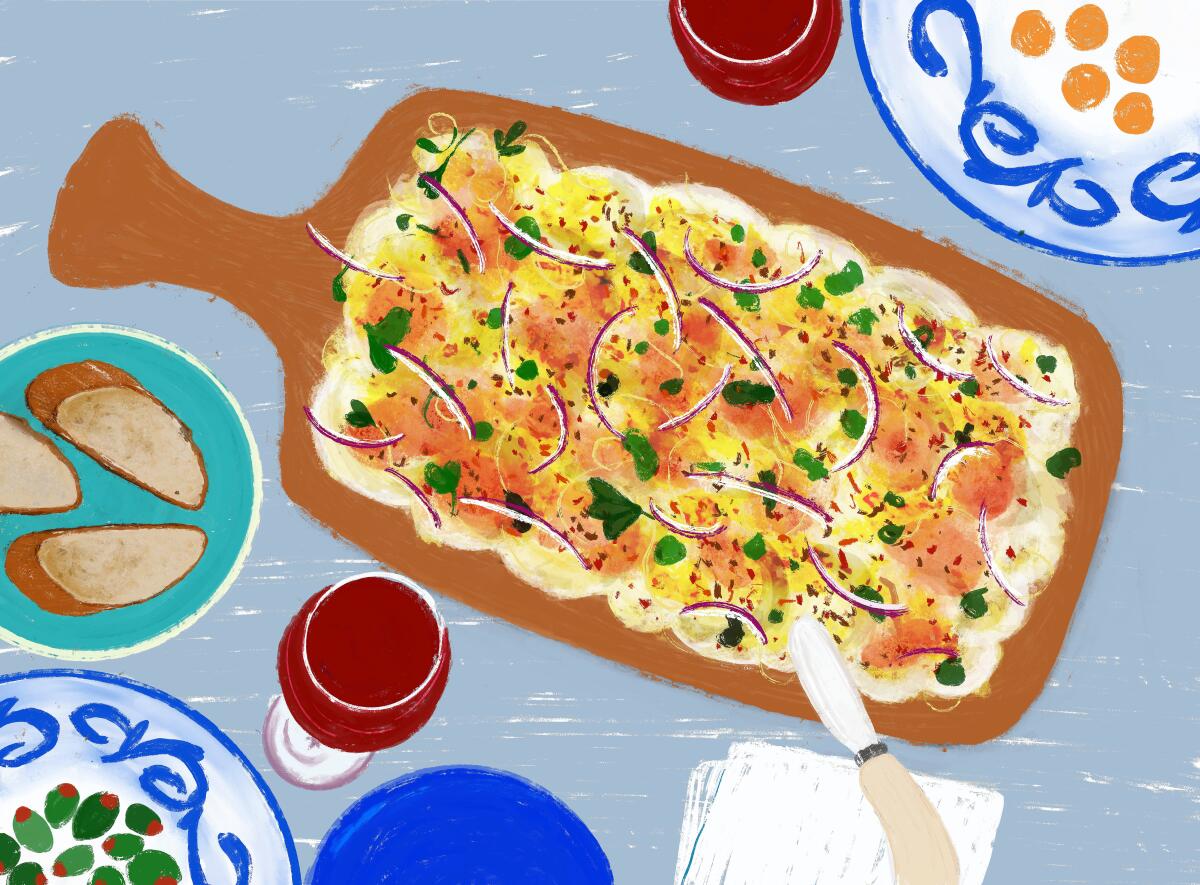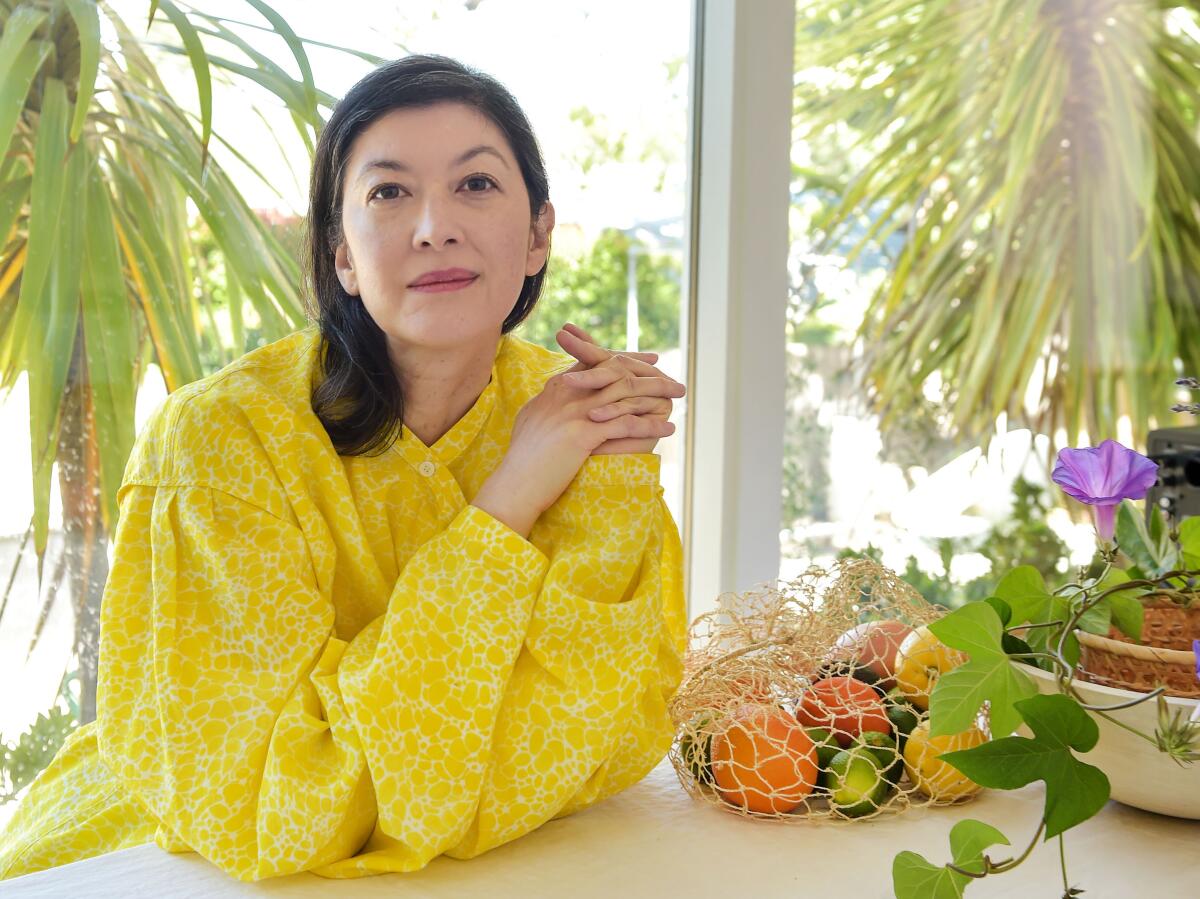When viral food trends test us

It crept up on us like these things often do. Over days, a subsonic current of a question, undulating from the maddening town square that is social media. Should we write about butter boards?
I’m Daniel Hernandez, Food editor at The Times. In this busy week in Tasting Notes, we muster the courage to confront the viral trend of butter boards; plus, our marquee podcast “The Times” dives back into my culinary investigation on fermented drinks from Mexico; and finally, we welcome our new — but familiar — deputy Food editor.
Enjoying this newsletter? Consider subscribing to the Los Angeles Times
Your support helps us deliver the news that matters most. Become a subscriber.
Do we have to say it?
The butter board is basically a cutting or serving board slathered with semi-warm butter and dressed with toppings like honey, zest or edible flowers. The concept originated with a lauded chef in Oregon. On Sept. 15, a TikTok-er who writes that she was feeling “in a silly goofy butter mood” decided to post a clip of her making a butter board.
In three weeks, it’s been viewed more than 8.5 million times.
The emergence of an official food trend is an alchemical mystery. Why do some things take off on socials, exceed all viral expectations and rocket into outer space? How does this happen, no matter how revolting or nonsensical the trend can be?
Here at Food, of course we saw the butter board hurtling in our direction. On internal channels, it kept popping up. A story in the New York Times pretty much cemented the trend as certified.
There are a few approaches a publication can take when confronting a new food trend. One is to glom onto it with reckless abandon, declaring it trendy yourself by doing little more than repeating fleeting material already recycled in other publications. Another is to ignore it, resisting any urge to add to a viral trend’s avalanche of media hits.
A third would be to confront a questionable trend head-on. After holding our tongues and our keyboards, the butter board boom became too annoying to bear. So thank you to my colleague Jessica Roy, who armored up and said, “Enough.”
“If you want to make a lovely display of finger foods for your guests, you have many options with minimal opportunities to contract food poisoning or your neighbor’s kid’s daycare cough,” Roy writes. “Did you know that you can have a butter bell in your home and have perfectly spreadable butter available for you to use at any time of day or night?”
Or, you know, you can also just toast some bread and spread butter on it. Mind blown.
Eat your way across L.A.
Get our weekly Tasting Notes newsletter for reviews, news and more.
You may occasionally receive promotional content from the Los Angeles Times.
Roy makes a case against embracing the butter board. Yet having to even state the argument in itself feels like a form of defeat. The vibe plays off of what happened after the Food and Drug Administration had to come out and tell the U.S. public to not cook chicken breast in NyQuil medical syrup. Buzzfeed News later reported that TikTok searches for NyQuil chicken multiplied by 1,400% after the warning. So did amplifying the trend neutralize it or make things worse?
Some of this stuff is just borderline criminal and done obviously in bad faith: Remember “mouth cooking?” Apologies if the memory is triggering.
Social media platforms are chaotic, nefarious and warp our values and sense of reason. It’s been said and proved many times over. The systems privilege outrage over any other response, so hate-watching something gives it just as much power as watching it out of love. Algorithms purposefully manipulate our emotions.
This, I’m sorry to say, is why I am currently holding back on fully responding to the apparent affront to Mexican food that is “Mexican Week” on the Netflix show “The Great British Bake Off.” The episode became available in North America on Friday, but clips on social media all week have shown unforgivable butchering of Mexican food phrases and practices on the program.
Folks have been warning us in recent days that it’s actually worse than we think. I almost can’t look. But if trends persist, the truth is, I won’t be able to hold out for long.
Have a question?
Other stories
Here are other don’t-miss stories that came across our plate this week.
— Sylvia Wu moved from China to the United States before World War II and by 1959, horrified by the faux-Cantonese dishes she found normalized in Los Angeles, decided to open Madame Wu’s Garden restaurant in Santa Monica. For decades, she served smartly dressed Hollywood A-listers. “Everybody in this town knows Madame Wu,” Merv Griffin once told The Times. She died on Sept. 29 at 106, writes obituaries editor Steve Marble.
— If you haven’t caught up with Jenn Harris’ terrific new video series on dumplings, Episode 4 might be the best spot yet to do it. She goes to Koreatown to sample mandu at Pao Jao Dumpling House, CHD Mandu and Myung In. (Can someone make mandu go trendy please, to help drown out the craziness?)
— Earlier this year I published a feature on the wonders of Mexican fermented beverages on the streets of L.A. This week on “The Times” podcast with Gustavo Arellano, we discuss tepache, tejuino and pulque. We also hear from the vendors themselves, and from listeners who dialed in with their own memories and methods with these fascinating rustic ferments.
— “It’s time to open that bag of chips again,” says a Trader Joe’s executive, announcing that the so-L.A. grocery chain is returning to offering in-store free samples of its favorite products.
— A bunch of SoCal names are adding themselves soon to the barrage of chefs planting more flags in Las Vegas, reports Stephanie Breijo, with more in her weekly news bites column.
— Remember, tacos in our city are Michelin-starred, so don’t much need any colonizing, sloppy treatment; Harris reminds us, with three inventive tacos to try now in Los Angeles.
— Everyone on the Food team this week is delighted with the arrival of a new leader in our ranks. Some of you may know her byline or her cookbooks. Dear readers, please welcome Betty Hallock, deputy Food editor. Her return, I think, is as clear a signal as we can send at this point: L.A. Times Food is seriously back.

Eat your way across L.A.
Get our weekly Tasting Notes newsletter for reviews, news and more.
You may occasionally receive promotional content from the Los Angeles Times.




